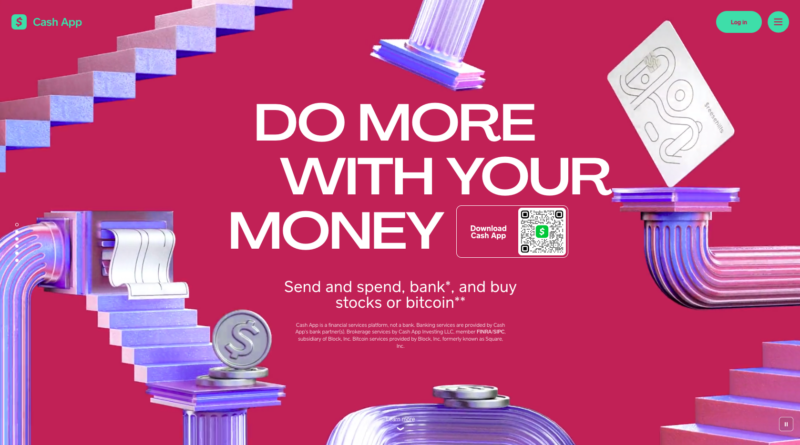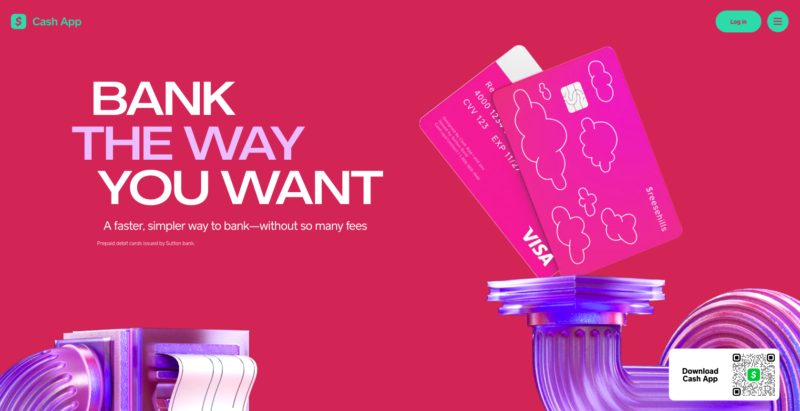Cash App is a popular mobile payment service that allows users to send and receive money, buy and sell Bitcoin, and trade stocks. But as is the case with many fintech companies, many people want to know if Cash App is a bank and, if not, how can they provide similar services to banks. After all, the company has reported over 70 million annual transactions and close to $2 billion in yearly profits.
In this article, I’ll share the details about Cash App and let you know where the money goes when your employer or friend pays you via the app.
Check This Out: Use Wallet Hacks’s referral promotion code JKJDBWT (click to copy referral code) to earn a $5 bonus cash by joining Cash App and completing a minimum $5 transaction in the first 14 days.
Table of Contents
- What Bank Does Cash App Use?
- What Bank Does Cash App Use for Plaid?
- Does a Bank own Cash App?
- What Bank Is the Cash App Cash Card Associated With?
- Is Cash App FDIC-Insured?
- What Is the Cash App Routing Number?
- How Does Cash App Direct Deposit Work?
- Do You Need a Bank Account for Cash App?
- Do You Need a Cash App Debit Card?
- Does Cash App Refund Money?
- Can You Get a Bank Statement from Cash App?
- Final Thoughts
What Bank Does Cash App Use?
Cash App is a fintech, not a bank, but it is able to offer banking services through its partnership with Lincoln Savings Bank (FDIC# 14207) and Sutton Bank (FDIC# 5962). Your Cash App balance is eligible for up to $250,000 in FDIC coverage through its bank partners.
Here is how Cash App describes its banking relationship, “Cash App is a financial services company, not a bank. Banking services are provided by Cash App’s bank partner(s). Debit cards issued by Sutton Bank, pursuant to a license from Visa USA Inc.”
Typically, Sutton Bank issues the Cash App debit card while Lincoln Savings Bank completes direct deposits. You don’t have to choose which bank completes each task or create accounts with both institutions.
Instead, you receive personalized banking details when you join Cash App. All users have the same app experience and membership perks regardless of which bank handles their transactions.
The outbound transfer limits are consistent for all users – non-verified users can withdraw up to $250 in a seven-day period and $1,000 in inbound transfers over a 30-day period, and verified users can transfer out up to $7,500 every seven days and don’t have inbound transfer limits.

What Bank Does Cash App Use for Plaid?
Cash App and other personal finance apps use Plaid to link your banking accounts securely. In most situations, Cash App uses Lincoln Savings Bank for Plaid as that’s the more common routing number the digital wallet users have for direct deposit and bill payments.
Plaid may tell you which bank partner that Cash App is using when you provide your routing number with automatic or manual setup.
Does a Bank own Cash App?
Cash App is owned by financial tech (fintech) company Block, Inc. This company was previously known as Square before its rebranding in late 2021.
Cash App is a direct competitor to Venmo or PayPal, which are also non-bank finance apps. You can use these services to receive payments, complete purchases, and send money to friends with minimal or no fees and fast transfer speeds.
What Bank Is the Cash App Cash Card Associated With?
Sutton Bank issues the Cash Card on behalf of Cash App. The issuing bank doesn’t matter as much as the debit card’s payment processor. In this case, the Cash Card is a Visa debit card which means it’s accepted virtually everywhere in the world.
This is good news as most merchants accept Visa and Mastercard and tend to charge lower processing fees than American Express.
Is Cash App FDIC-Insured?
Cash App balances are eligible for FDIC coverage up to $250,000 through banking partner Wells Fargo Bank, N.A., Member FDIC. The FDIC# for Wells Fargo is 3511.
It’s essential to note that FDIC coverage only applies to accounts with a Cash Card. Active sponsored accounts are also eligible when you invite children between ages 13 and 17. So, be sure to request a free Cash App debit card to have FDIC-insured account balances.
Keep in mind that your total coverage benefits may be lower if you have a banking account with this partner bank. Additionally, FDIC insurance doesn’t reimburse fraudulent transactions and only protects your account balance if Cash App or Wells Fargo goes out of business.
Finally, any cryptocurrency or investments through Cash App are eligible for SIPC insurance which covers stock brokerages. Your coverage limits are up to $500,000 in securities which includes up to $250,000 in claims for cash balances held in your investment accounts.
Learn more about the difference between FDIC and SIPC coverage benefits.
What Is the Cash App Routing Number?
The routing number you use to enroll in Cash App direct deposit or bill pay is one of the following:
- 073923033 (Lincoln Savings Bank)
- 041215663 (Sutton Bank)
Customer reviews indicate the most common Cash App routing number is 073923033 for Lincoln Savings Bank.
If you’re sending money to your Cash App Card, you only need the details stamped on the debit card, such as your card number and expiration date.
You can verify your routing and account number by completing these steps in the app:
- Tap the “Money” icon on the Cash App homepage
- Select the “Account & Routing” button in the top right corner.
- You can copy and paste each number when needed
Cash App also helps you automatically set up direct deposit with many popular employers and payroll providers. To sync your account, search for your employer or provider’s name (i.e., ADP, Amazon, Gusto, Paychex, Paycom, Walmart).
The app can also generate a digital form you can save and provide to your employer when manual setup is necessary.
Direct deposit benefits from Cash App include receiving your paycheck up to two days early, FDIC-insured balances, and unlimited free withdrawals at in-network ATMs. The latter perk requires receiving at least $300 in monthly direct deposits to waive the ATM withdrawal fee.
There are several other ways you can make money with Cash App and retrieve your banking details when it’s time to receive payment.
How Does Cash App Direct Deposit Work?
After enrolling in direct deposit, it’s possible to receive up to $25,000 per transaction and $50,000 in a 24-hour period. The timing of Cash App’s direct deposit function can allow you to receive your paycheck and benefits up to two days earlier than competing banks.
However, the deposit times depend on several factors, and deposits can take from one to five business days to receive. Additionally, your first deposit from a newly-enrolled account can also take longer. You can contact Cash App five days after the anticipated receipt date to inquire about a missing direct deposit.
Do You Need a Bank Account for Cash App?
You don’t need a bank account to join, but you will need one if you want to transfer out your funds and don’t plan on sending them to another Cash App user or spending the proceeds.
There are no withdrawal fees on non-instant transfers to an external bank, and you won’t pay monthly service fees with a free checking account.
Do You Need a Cash App Debit Card?
A Cash Card debit card is optional, but getting one is not a bad idea even if you only intend to use it sporadically, as you can lock the card in the app to prevent unauthorized purchases. It’s free, offers customizable card designs, and will arrive in the mail from Sutton Bank within ten business days, and you can use your digital card right away.
Kids debit cards are available for teens between ages 13 and 17 after receiving parental permission.
The Cash Card can be added to digital wallets like Apple Pay and Google Pay. It can also be used for ATM withdrawals and allows you to earn cash back at participating merchants.
Another compelling reason to have a debit card is to ensure your Cash App account is FDIC-insured. Custodial accounts for users 17 or younger are automatically eligible for coverage.

Does Cash App Refund Money?
Unfortunately, Cash App’s fraud benefits are limited, so you will want to keep an eye on your account activity and only maintain an account balance that’s needed to cover your spending.
Unauthorized debit card purchases are the only fraudulent activity likely to be reimbursed. Cash App recommends that you contact the merchant first to see if they can cancel the transaction. If not, you can dispute the transaction within the app for Cash App to review and issue a refund.
You should also report your debit card as lost or stolen to get a new card number to prevent another occurrence. The app may also send verification alerts when it detects unusual activity.
No payment app is 100% risk-free, but Cash App uses encryption and 24/7 surveillance to protect your data. The app also tries to help you automate your finances as much as possible for convenience and to minimize manually retrieving your info.
Be careful about who you share your Cash App bank numbers with to prevent unauthorized activity that can be a headache to clean up. Additionally, sending money to strangers is also non-reimbursable.
Can You Get a Bank Statement from Cash App?
Yes. You can access your monthly statements online by finding the “Documents” tab and then tapping “Account Statements.” Your electronic statements include all deposits and withdrawals for the statement period, regardless of which partner bank conducts the transaction.
Check This Out: Use Wallet Hacks’s referral promotion code JKJDBWT (click to copy referral code) to earn a $5 bonus cash by joining Cash App and completing a minimum $5 transaction in the first 14 days.
Final Thoughts
In summary, Cash App is not an actual bank but a fintech company that can offer banking services through its partnership with Lincoln National Bank and Sutton Bank.
You can easily find your banking details by logging into your account through the mobile app or website. But remember, the partner bank doesn’t matter that much, as all users share the same benefits and experience.
The post What Bank Is Cash App? appeared first on Best Wallet Hacks.
from Best Wallet Hacks https://ift.tt/aR8A4os
Comments
Post a Comment
We will appreciate it, if you leave a comment.